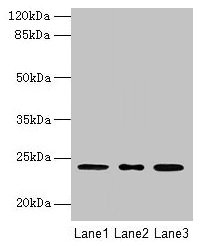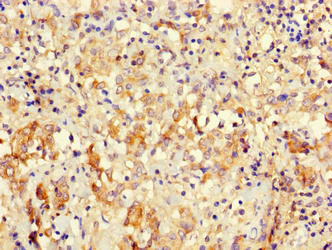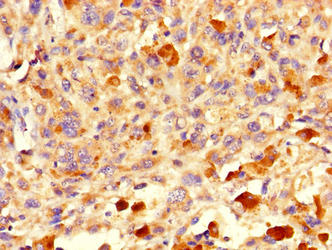Full Product Name
Rabbit anti-Homo sapiens (Human) MRPL58 Polyclonal antibody
Alternative Names
Digestion substraction 1 antibody; DS-1 antibody; DS1 antibody; Ict1 antibody; ICT1_HUMAN antibody; Immature colon carcinoma transcript 1 antibody; Immature colon carcinoma transcript 1 protein antibody; mitochondrial antibody; Peptidyl-tRNA hydrolase ICT1 antibody; Peptidyl-tRNA hydrolase ICT1, mitochondrial antibody
Immunogen
Recombinant Human Peptidyl-tRNA hydrolase ICT1, mitochondrial protein (30-206AA)
Immunogen Species
Homo sapiens (Human)
Conjugate
Non-conjugated
The MRPL58 Antibody (Product code: CSB-PA613490HA01HU) is Non-conjugated. For MRPL58 Antibody with conjugates, please check the following table.
Available Conjugates
| Conjugate |
Product Code |
Product Name |
Application |
| HRP |
CSB-PA613490HB01HU |
MRPL58 Antibody, HRP conjugated |
ELISA |
| FITC |
CSB-PA613490HC01HU |
MRPL58 Antibody, FITC conjugated |
|
| Biotin |
CSB-PA613490HD01HU |
MRPL58 Antibody, Biotin conjugated |
ELISA |
Purification Method
>95%, Protein G purified
Concentration
It differs from different batches. Please contact us to confirm it.
Buffer
Preservative: 0.03% Proclin 300
Constituents: 50% Glycerol, 0.01M PBS, PH 7.4
Tested Applications
ELISA, WB, IHC
Recommended Dilution
| Application |
Recommended Dilution |
| WB |
1:1000-1:5000 |
| IHC |
1:20-1:200 |
Storage
Upon receipt, store at -20°C or -80°C. Avoid repeated freeze.
Lead Time
Basically, we can dispatch the products out in 1-3 working days after receiving your orders. Delivery time maybe differs from different purchasing way or location, please kindly consult your local distributors for specific delivery time.
Usage
For Research Use Only. Not for use in diagnostic or therapeutic procedures.









